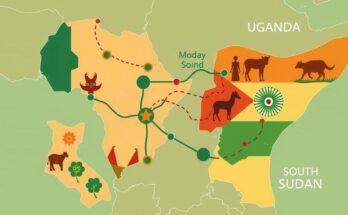South Sudan’s relationship with Uganda is critical yet challenging, influenced by historical support and ongoing tensions related to military involvement. As it navigates fragile internal governance and humanitarian crises, South Sudan must establish a balanced foreign policy. Economic interdependence complicates this relationship, emphasizing the need to address governance issues and avoid reliance on any single nation.
South Sudan, the world’s youngest nation, is currently at a critical point regarding its bilateral relations with Uganda. Both nations share historical and cultural ties, yet their differing political interests may substantially affect regional stability and hinder economic development. As South Sudan continues to face internal challenges, the influence of Uganda becomes increasingly significant, with implications for both domestic politics and economic cooperation.
Uganda has played a prominent role in South Sudan’s journey toward independence, providing military and logistical support during its protracted struggle against the Sudanese government, framing it as part of the effort against the Lord’s Resistance Army (LRA). Since South Sudan’s independence in 2011, bilateral relations have alternated between cooperation and competition, impacting trade, security, and peace processes in the region.
However, the dynamics between the two countries are not without tension. Uganda’s military presence in South Sudan during the civil strife that began in December 2013 has been controversial. Support from the Ugandan People’s Defense Force (UPDF) for the South Sudanese government exacerbated existing fractures and waves of humanitarian crises, leading to violence, property destruction, and massive displacement of people.
While a peace agreement was established in 2018, South Sudan remains fractured and grapples with a worsening humanitarian situation. Relations with Uganda are now intricately linked to broader geopolitical dynamics, as both nations have intervened in neighboring conflicts, exacerbating violations of international norms. Uganda’s backing of President Kiir’s government has deepened divisions, drawing South Sudan into regional power struggles and international scrutiny.
The economic dimension of their relationship is also critical. Uganda has established infrastructure that links its trade and energy supplies to South Sudan’s untapped resources, including oil reserves. This economic interdependence creates both opportunities and risks, requiring both nations to manage competing influences over resource control and trade effectively.
South Sudan’s strategic position in the Horn of Africa makes it an attractive partner for global powers—international actors are interested in its resources, which further complicates its foreign relations. Uganda’s close ties to South Sudan’s government are viewed with suspicion by other regional players, potentially inviting negative repercussions for stability.
Navigating its relationship with Uganda necessitates a careful approach from South Sudan. A diplomatic roadmap that emphasizes sovereignty while recognizing the mutual economic interests of both nations is crucial. Preventing excessive reliance on Uganda is essential for maintaining stability and safeguarding the nation against external pressures.
South Sudanese leaders must prioritize strengthening diplomatic ties with other regional powers while also addressing internal governance issues to reduce vulnerability to external influences. Achieving lasting peace and political resilience will be cornerstone objectives on the path to safeguarding South Sudan’s sovereignty against the backdrop of regional complexities.
In summary, South Sudan’s relationship with Uganda is essential yet fraught with complexities derived from historical context, economic ties, and regional geopolitics. As South Sudan strives for stability amid internal strife, a balanced approach to diplomatic engagement and diversification of international partnerships is critical. Strengthening governance and promoting inclusive dialogue will be vital to reducing external influences while fostering national sovereignty and regional stability.
Original Source: www.radiotamazuj.org




